BSBHRM501 Manage Human Resource Services: Practical Project Report
VerifiedAdded on 2023/06/11
|24
|6588
|240
Practical Assignment
AI Summary
This document presents a solution to a BSBHRM501 Manage Human Resource Services assessment, focusing on practical project tasks completed for LET Training and Consultation Services Pty Ltd. The project includes developing HR delivery strategies for JKL Industries, addressing their industrial relations history and future needs in light of organizational changes. It covers strategic options, cost-benefit analysis, and recommendations for restructuring HR services, redeploying employees, and enhancing performance management and industrial relations. The assessment also involves delivering HR services by addressing performance issues through case studies and service level agreements, evaluating HR service delivery using a balanced scorecard, and integrating business ethics into HR practices through scenario-based questions. The overall aim is to provide JKL Industries with a comprehensive HR strategy that aligns with its business goals and values.
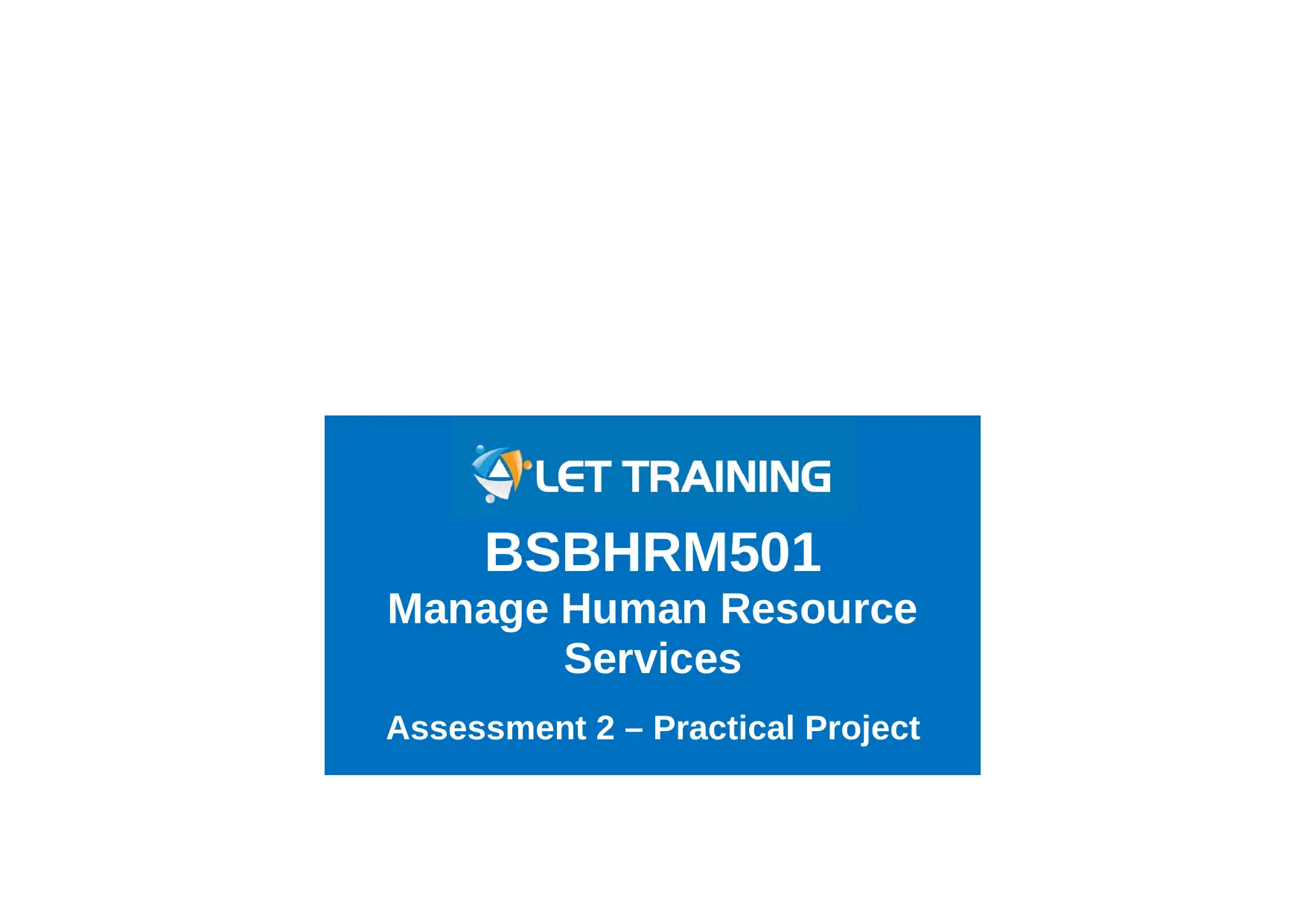
BSBHRM501
Manage Human Resource
Services
Assessment 2 – Practical Project
Manage Human Resource
Services
Assessment 2 – Practical Project
Paraphrase This Document
Need a fresh take? Get an instant paraphrase of this document with our AI Paraphraser
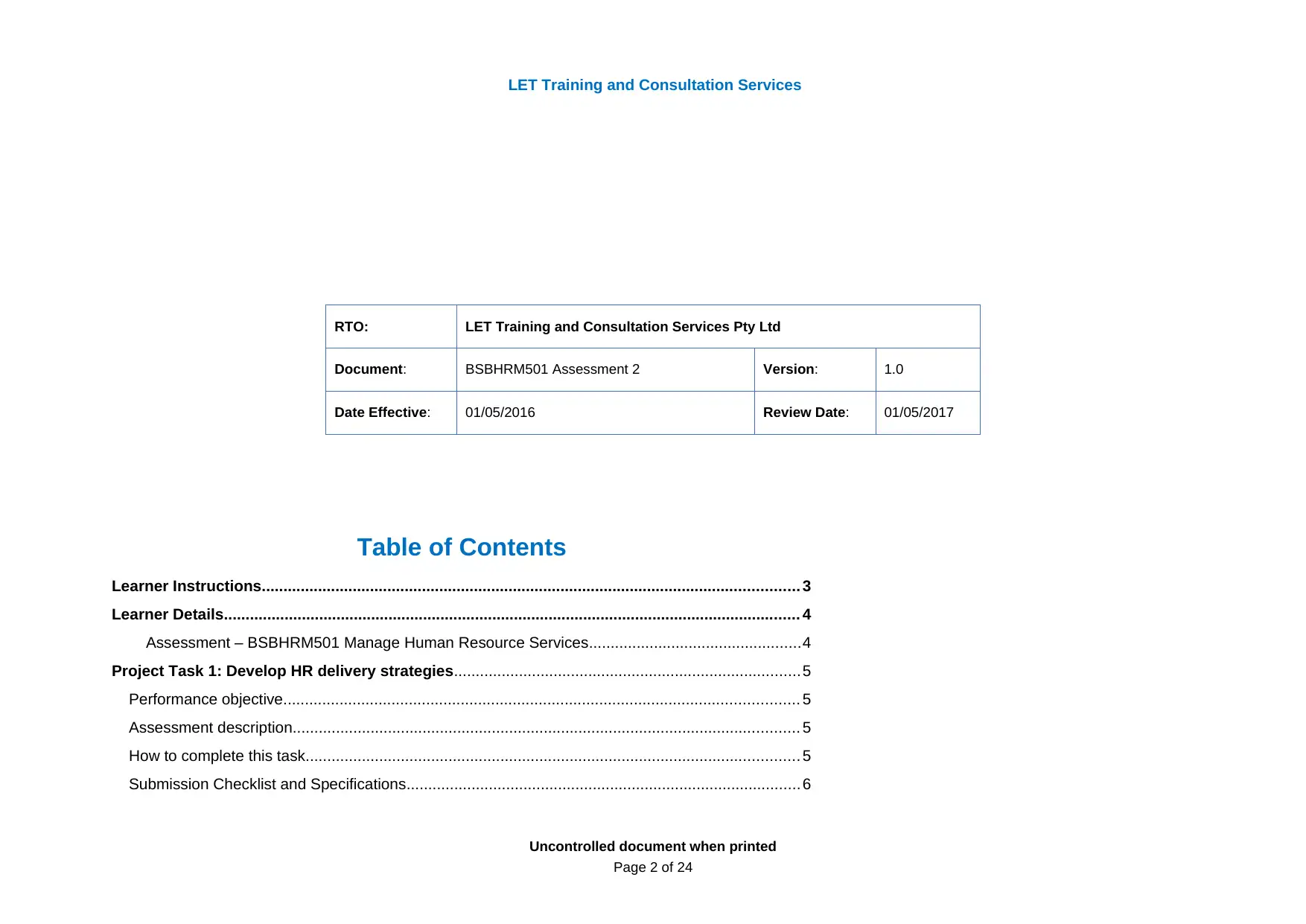
LET Training and Consultation Services
RTO: LET Training and Consultation Services Pty Ltd
Document: BSBHRM501 Assessment 2 Version: 1.0
Date Effective: 01/05/2016 Review Date: 01/05/2017
Table of Contents
Learner Instructions............................................................................................................................ 3
Learner Details..................................................................................................................................... 4
Assessment – BSBHRM501 Manage Human Resource Services.................................................4
Project Task 1: Develop HR delivery strategies................................................................................5
Performance objective....................................................................................................................... 5
Assessment description..................................................................................................................... 5
How to complete this task.................................................................................................................. 5
Submission Checklist and Specifications........................................................................................... 6
Uncontrolled document when printed
Page 2 of 24
RTO: LET Training and Consultation Services Pty Ltd
Document: BSBHRM501 Assessment 2 Version: 1.0
Date Effective: 01/05/2016 Review Date: 01/05/2017
Table of Contents
Learner Instructions............................................................................................................................ 3
Learner Details..................................................................................................................................... 4
Assessment – BSBHRM501 Manage Human Resource Services.................................................4
Project Task 1: Develop HR delivery strategies................................................................................5
Performance objective....................................................................................................................... 5
Assessment description..................................................................................................................... 5
How to complete this task.................................................................................................................. 5
Submission Checklist and Specifications........................................................................................... 6
Uncontrolled document when printed
Page 2 of 24
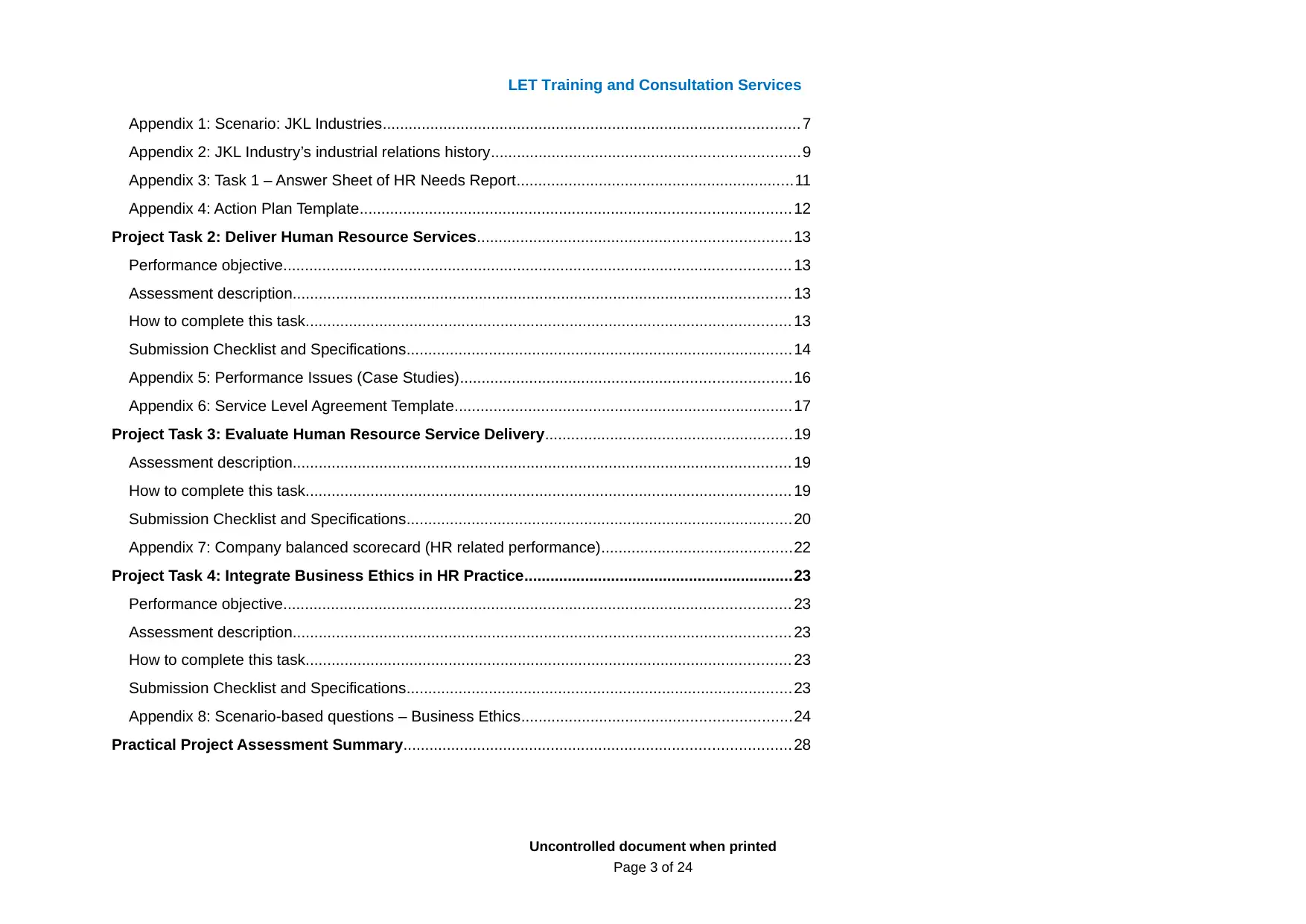
LET Training and Consultation Services
Appendix 1: Scenario: JKL Industries................................................................................................ 7
Appendix 2: JKL Industry’s industrial relations history.......................................................................9
Appendix 3: Task 1 – Answer Sheet of HR Needs Report................................................................11
Appendix 4: Action Plan Template...................................................................................................12
Project Task 2: Deliver Human Resource Services........................................................................13
Performance objective..................................................................................................................... 13
Assessment description................................................................................................................... 13
How to complete this task................................................................................................................ 13
Submission Checklist and Specifications.........................................................................................14
Appendix 5: Performance Issues (Case Studies)............................................................................16
Appendix 6: Service Level Agreement Template..............................................................................17
Project Task 3: Evaluate Human Resource Service Delivery.........................................................19
Assessment description................................................................................................................... 19
How to complete this task................................................................................................................ 19
Submission Checklist and Specifications.........................................................................................20
Appendix 7: Company balanced scorecard (HR related performance)............................................22
Project Task 4: Integrate Business Ethics in HR Practice..............................................................23
Performance objective..................................................................................................................... 23
Assessment description................................................................................................................... 23
How to complete this task................................................................................................................ 23
Submission Checklist and Specifications.........................................................................................23
Appendix 8: Scenario-based questions – Business Ethics..............................................................24
Practical Project Assessment Summary.........................................................................................28
Uncontrolled document when printed
Page 3 of 24
Appendix 1: Scenario: JKL Industries................................................................................................ 7
Appendix 2: JKL Industry’s industrial relations history.......................................................................9
Appendix 3: Task 1 – Answer Sheet of HR Needs Report................................................................11
Appendix 4: Action Plan Template...................................................................................................12
Project Task 2: Deliver Human Resource Services........................................................................13
Performance objective..................................................................................................................... 13
Assessment description................................................................................................................... 13
How to complete this task................................................................................................................ 13
Submission Checklist and Specifications.........................................................................................14
Appendix 5: Performance Issues (Case Studies)............................................................................16
Appendix 6: Service Level Agreement Template..............................................................................17
Project Task 3: Evaluate Human Resource Service Delivery.........................................................19
Assessment description................................................................................................................... 19
How to complete this task................................................................................................................ 19
Submission Checklist and Specifications.........................................................................................20
Appendix 7: Company balanced scorecard (HR related performance)............................................22
Project Task 4: Integrate Business Ethics in HR Practice..............................................................23
Performance objective..................................................................................................................... 23
Assessment description................................................................................................................... 23
How to complete this task................................................................................................................ 23
Submission Checklist and Specifications.........................................................................................23
Appendix 8: Scenario-based questions – Business Ethics..............................................................24
Practical Project Assessment Summary.........................................................................................28
Uncontrolled document when printed
Page 3 of 24
⊘ This is a preview!⊘
Do you want full access?
Subscribe today to unlock all pages.

Trusted by 1+ million students worldwide
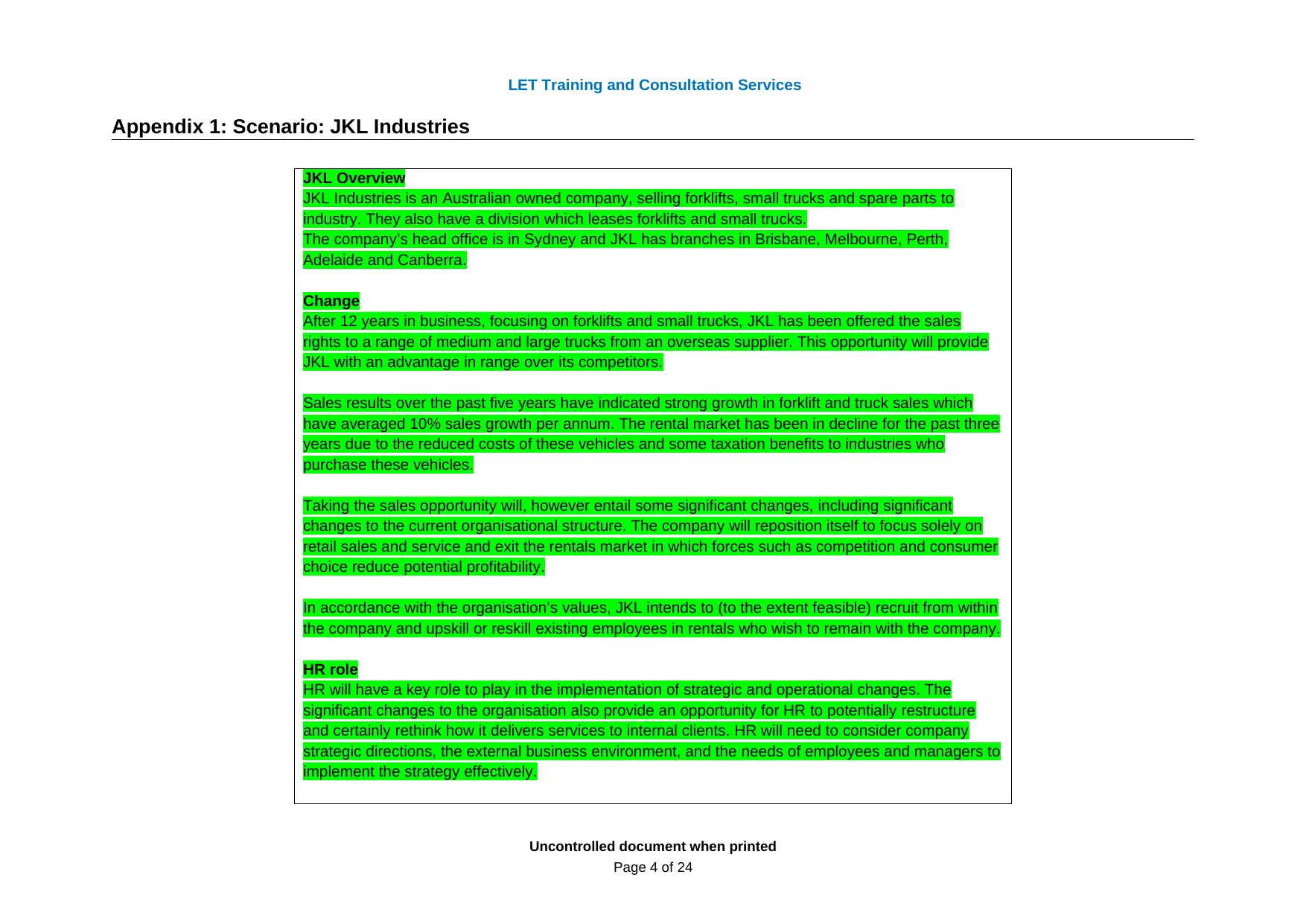
LET Training and Consultation Services
Appendix 1: Scenario: JKL Industries
JKL Overview
JKL Industries is an Australian owned company, selling forklifts, small trucks and spare parts to
industry. They also have a division which leases forklifts and small trucks.
The company’s head office is in Sydney and JKL has branches in Brisbane, Melbourne, Perth,
Adelaide and Canberra.
Change
After 12 years in business, focusing on forklifts and small trucks, JKL has been offered the sales
rights to a range of medium and large trucks from an overseas supplier. This opportunity will provide
JKL with an advantage in range over its competitors.
Sales results over the past five years have indicated strong growth in forklift and truck sales which
have averaged 10% sales growth per annum. The rental market has been in decline for the past three
years due to the reduced costs of these vehicles and some taxation benefits to industries who
purchase these vehicles.
Taking the sales opportunity will, however entail some significant changes, including significant
changes to the current organisational structure. The company will reposition itself to focus solely on
retail sales and service and exit the rentals market in which forces such as competition and consumer
choice reduce potential profitability.
In accordance with the organisation’s values, JKL intends to (to the extent feasible) recruit from within
the company and upskill or reskill existing employees in rentals who wish to remain with the company.
HR role
HR will have a key role to play in the implementation of strategic and operational changes. The
significant changes to the organisation also provide an opportunity for HR to potentially restructure
and certainly rethink how it delivers services to internal clients. HR will need to consider company
strategic directions, the external business environment, and the needs of employees and managers to
implement the strategy effectively.
Uncontrolled document when printed
Page 4 of 24
Appendix 1: Scenario: JKL Industries
JKL Overview
JKL Industries is an Australian owned company, selling forklifts, small trucks and spare parts to
industry. They also have a division which leases forklifts and small trucks.
The company’s head office is in Sydney and JKL has branches in Brisbane, Melbourne, Perth,
Adelaide and Canberra.
Change
After 12 years in business, focusing on forklifts and small trucks, JKL has been offered the sales
rights to a range of medium and large trucks from an overseas supplier. This opportunity will provide
JKL with an advantage in range over its competitors.
Sales results over the past five years have indicated strong growth in forklift and truck sales which
have averaged 10% sales growth per annum. The rental market has been in decline for the past three
years due to the reduced costs of these vehicles and some taxation benefits to industries who
purchase these vehicles.
Taking the sales opportunity will, however entail some significant changes, including significant
changes to the current organisational structure. The company will reposition itself to focus solely on
retail sales and service and exit the rentals market in which forces such as competition and consumer
choice reduce potential profitability.
In accordance with the organisation’s values, JKL intends to (to the extent feasible) recruit from within
the company and upskill or reskill existing employees in rentals who wish to remain with the company.
HR role
HR will have a key role to play in the implementation of strategic and operational changes. The
significant changes to the organisation also provide an opportunity for HR to potentially restructure
and certainly rethink how it delivers services to internal clients. HR will need to consider company
strategic directions, the external business environment, and the needs of employees and managers to
implement the strategy effectively.
Uncontrolled document when printed
Page 4 of 24
Paraphrase This Document
Need a fresh take? Get an instant paraphrase of this document with our AI Paraphraser
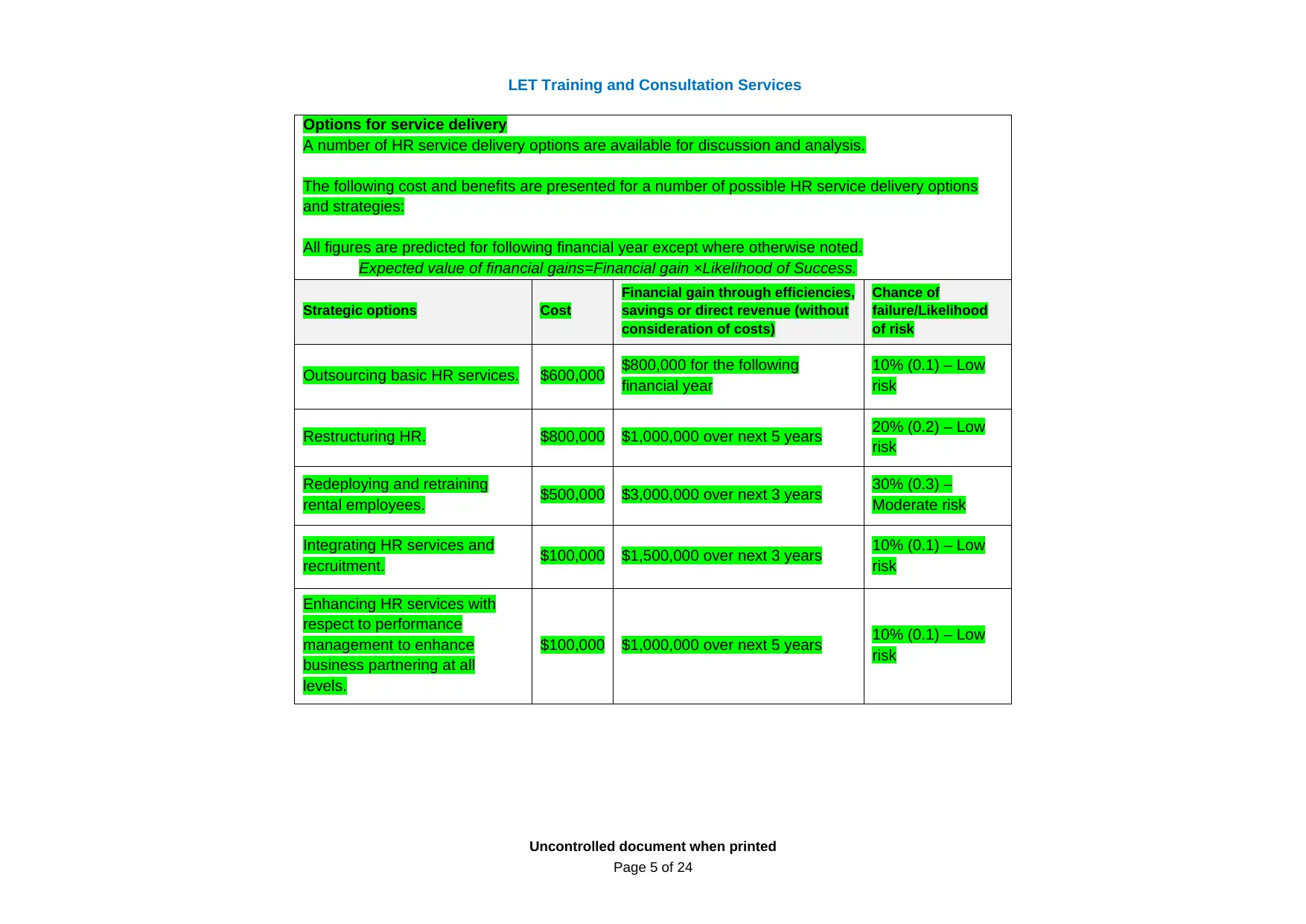
LET Training and Consultation Services
Options for service delivery
A number of HR service delivery options are available for discussion and analysis.
The following cost and benefits are presented for a number of possible HR service delivery options
and strategies:
All figures are predicted for following financial year except where otherwise noted.
Expected value of financial gains=Financial gain ×Likelihood of Success.
Strategic options Cost
Financial gain through efficiencies,
savings or direct revenue (without
consideration of costs)
Chance of
failure/Likelihood
of risk
Outsourcing basic HR services. $600,000 $800,000 for the following
financial year
10% (0.1) – Low
risk
Restructuring HR. $800,000 $1,000,000 over next 5 years 20% (0.2) – Low
risk
Redeploying and retraining
rental employees. $500,000 $3,000,000 over next 3 years 30% (0.3) –
Moderate risk
Integrating HR services and
recruitment. $100,000 $1,500,000 over next 3 years 10% (0.1) – Low
risk
Enhancing HR services with
respect to performance
management to enhance
business partnering at all
levels.
$100,000 $1,000,000 over next 5 years 10% (0.1) – Low
risk
Uncontrolled document when printed
Page 5 of 24
Options for service delivery
A number of HR service delivery options are available for discussion and analysis.
The following cost and benefits are presented for a number of possible HR service delivery options
and strategies:
All figures are predicted for following financial year except where otherwise noted.
Expected value of financial gains=Financial gain ×Likelihood of Success.
Strategic options Cost
Financial gain through efficiencies,
savings or direct revenue (without
consideration of costs)
Chance of
failure/Likelihood
of risk
Outsourcing basic HR services. $600,000 $800,000 for the following
financial year
10% (0.1) – Low
risk
Restructuring HR. $800,000 $1,000,000 over next 5 years 20% (0.2) – Low
risk
Redeploying and retraining
rental employees. $500,000 $3,000,000 over next 3 years 30% (0.3) –
Moderate risk
Integrating HR services and
recruitment. $100,000 $1,500,000 over next 3 years 10% (0.1) – Low
risk
Enhancing HR services with
respect to performance
management to enhance
business partnering at all
levels.
$100,000 $1,000,000 over next 5 years 10% (0.1) – Low
risk
Uncontrolled document when printed
Page 5 of 24
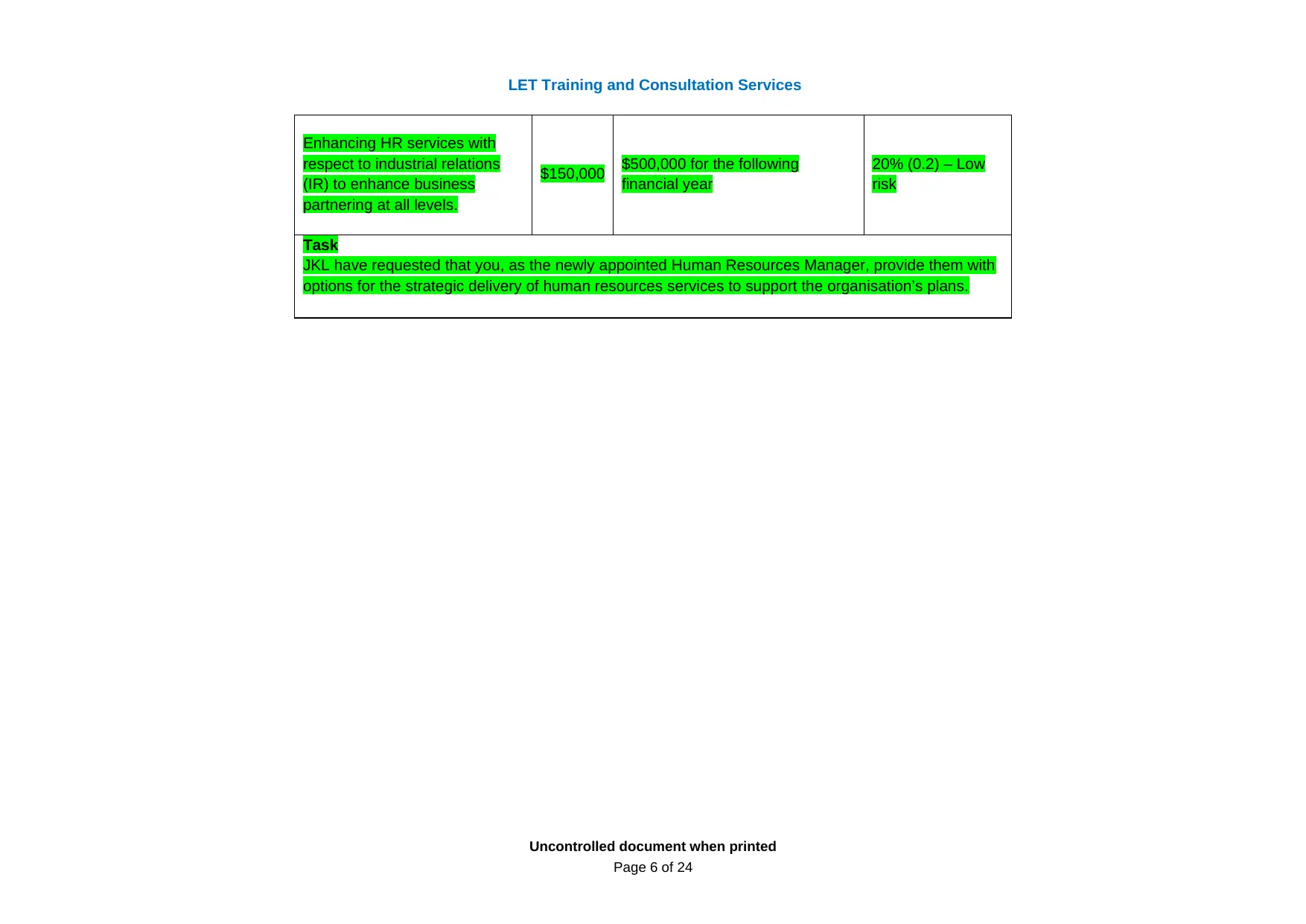
LET Training and Consultation Services
Enhancing HR services with
respect to industrial relations
(IR) to enhance business
partnering at all levels.
$150,000 $500,000 for the following
financial year
20% (0.2) – Low
risk
Task
JKL have requested that you, as the newly appointed Human Resources Manager, provide them with
options for the strategic delivery of human resources services to support the organisation’s plans.
Uncontrolled document when printed
Page 6 of 24
Enhancing HR services with
respect to industrial relations
(IR) to enhance business
partnering at all levels.
$150,000 $500,000 for the following
financial year
20% (0.2) – Low
risk
Task
JKL have requested that you, as the newly appointed Human Resources Manager, provide them with
options for the strategic delivery of human resources services to support the organisation’s plans.
Uncontrolled document when printed
Page 6 of 24
⊘ This is a preview!⊘
Do you want full access?
Subscribe today to unlock all pages.

Trusted by 1+ million students worldwide
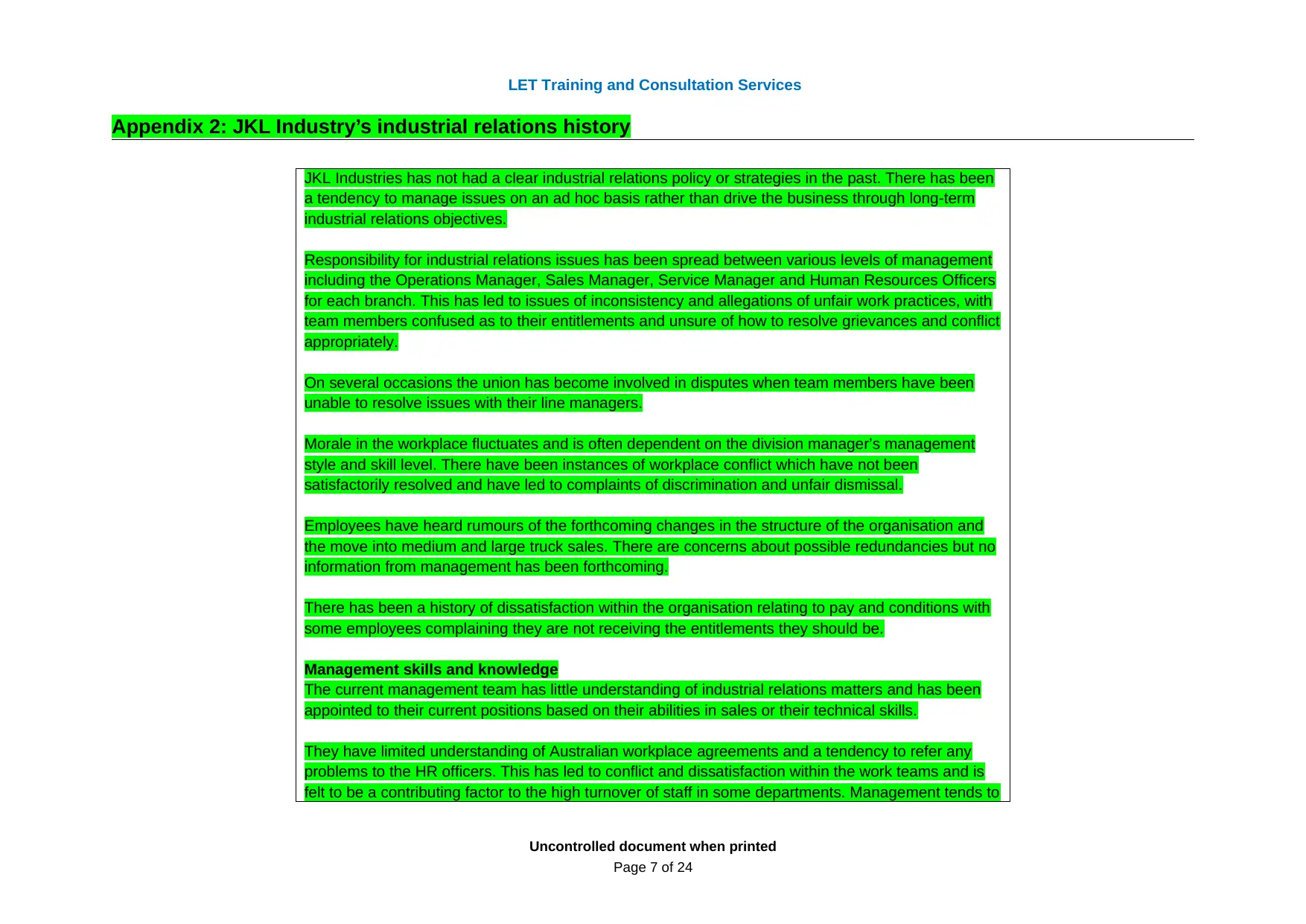
LET Training and Consultation Services
Appendix 2: JKL Industry’s industrial relations history
JKL Industries has not had a clear industrial relations policy or strategies in the past. There has been
a tendency to manage issues on an ad hoc basis rather than drive the business through long-term
industrial relations objectives.
Responsibility for industrial relations issues has been spread between various levels of management
including the Operations Manager, Sales Manager, Service Manager and Human Resources Officers
for each branch. This has led to issues of inconsistency and allegations of unfair work practices, with
team members confused as to their entitlements and unsure of how to resolve grievances and conflict
appropriately.
On several occasions the union has become involved in disputes when team members have been
unable to resolve issues with their line managers.
Morale in the workplace fluctuates and is often dependent on the division manager’s management
style and skill level. There have been instances of workplace conflict which have not been
satisfactorily resolved and have led to complaints of discrimination and unfair dismissal.
Employees have heard rumours of the forthcoming changes in the structure of the organisation and
the move into medium and large truck sales. There are concerns about possible redundancies but no
information from management has been forthcoming.
There has been a history of dissatisfaction within the organisation relating to pay and conditions with
some employees complaining they are not receiving the entitlements they should be.
Management skills and knowledge
The current management team has little understanding of industrial relations matters and has been
appointed to their current positions based on their abilities in sales or their technical skills.
They have limited understanding of Australian workplace agreements and a tendency to refer any
problems to the HR officers. This has led to conflict and dissatisfaction within the work teams and is
felt to be a contributing factor to the high turnover of staff in some departments. Management tends to
Uncontrolled document when printed
Page 7 of 24
Appendix 2: JKL Industry’s industrial relations history
JKL Industries has not had a clear industrial relations policy or strategies in the past. There has been
a tendency to manage issues on an ad hoc basis rather than drive the business through long-term
industrial relations objectives.
Responsibility for industrial relations issues has been spread between various levels of management
including the Operations Manager, Sales Manager, Service Manager and Human Resources Officers
for each branch. This has led to issues of inconsistency and allegations of unfair work practices, with
team members confused as to their entitlements and unsure of how to resolve grievances and conflict
appropriately.
On several occasions the union has become involved in disputes when team members have been
unable to resolve issues with their line managers.
Morale in the workplace fluctuates and is often dependent on the division manager’s management
style and skill level. There have been instances of workplace conflict which have not been
satisfactorily resolved and have led to complaints of discrimination and unfair dismissal.
Employees have heard rumours of the forthcoming changes in the structure of the organisation and
the move into medium and large truck sales. There are concerns about possible redundancies but no
information from management has been forthcoming.
There has been a history of dissatisfaction within the organisation relating to pay and conditions with
some employees complaining they are not receiving the entitlements they should be.
Management skills and knowledge
The current management team has little understanding of industrial relations matters and has been
appointed to their current positions based on their abilities in sales or their technical skills.
They have limited understanding of Australian workplace agreements and a tendency to refer any
problems to the HR officers. This has led to conflict and dissatisfaction within the work teams and is
felt to be a contributing factor to the high turnover of staff in some departments. Management tends to
Uncontrolled document when printed
Page 7 of 24
Paraphrase This Document
Need a fresh take? Get an instant paraphrase of this document with our AI Paraphraser
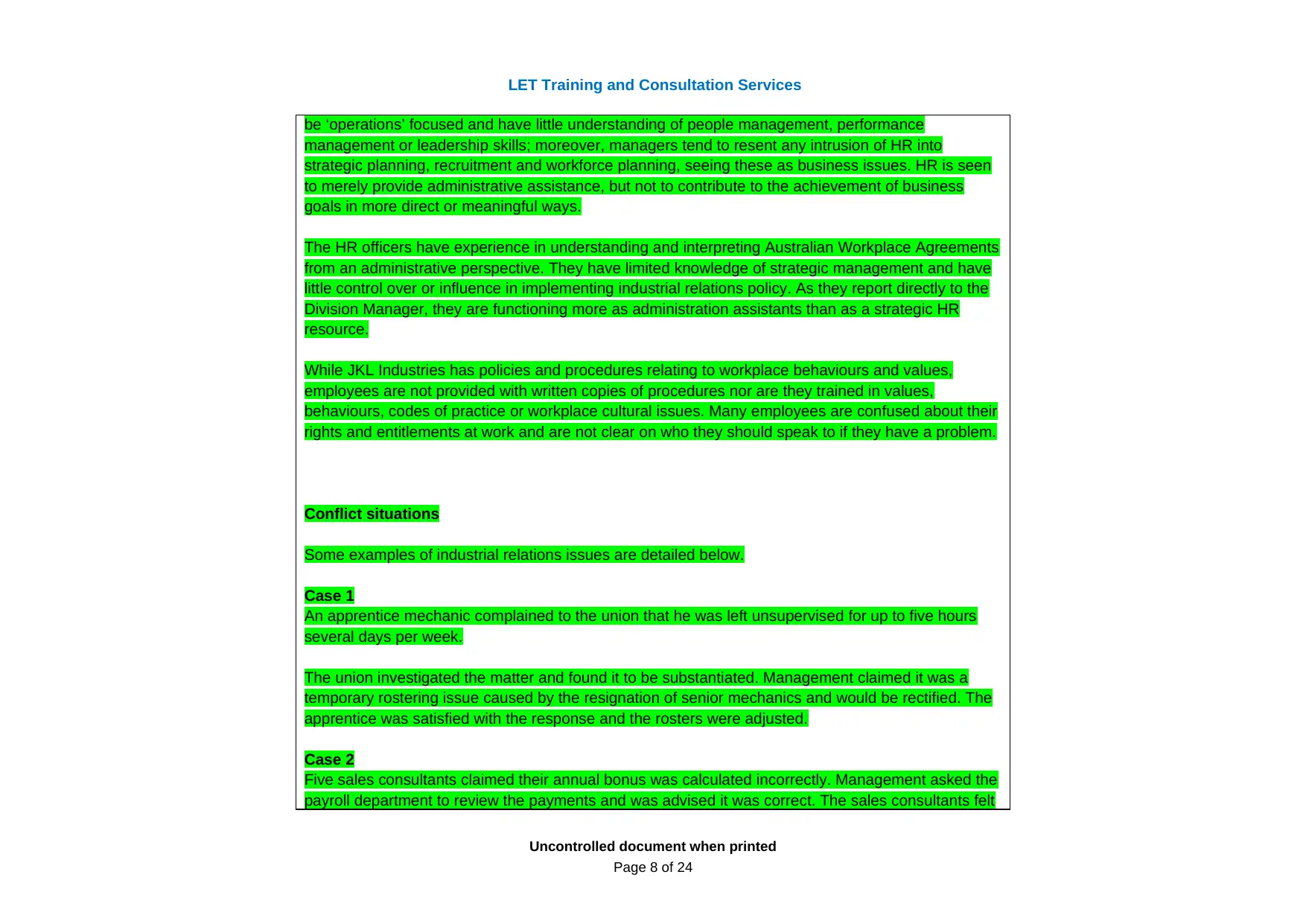
LET Training and Consultation Services
be ‘operations’ focused and have little understanding of people management, performance
management or leadership skills; moreover, managers tend to resent any intrusion of HR into
strategic planning, recruitment and workforce planning, seeing these as business issues. HR is seen
to merely provide administrative assistance, but not to contribute to the achievement of business
goals in more direct or meaningful ways.
The HR officers have experience in understanding and interpreting Australian Workplace Agreements
from an administrative perspective. They have limited knowledge of strategic management and have
little control over or influence in implementing industrial relations policy. As they report directly to the
Division Manager, they are functioning more as administration assistants than as a strategic HR
resource.
While JKL Industries has policies and procedures relating to workplace behaviours and values,
employees are not provided with written copies of procedures nor are they trained in values,
behaviours, codes of practice or workplace cultural issues. Many employees are confused about their
rights and entitlements at work and are not clear on who they should speak to if they have a problem.
Conflict situations
Some examples of industrial relations issues are detailed below.
Case 1
An apprentice mechanic complained to the union that he was left unsupervised for up to five hours
several days per week.
The union investigated the matter and found it to be substantiated. Management claimed it was a
temporary rostering issue caused by the resignation of senior mechanics and would be rectified. The
apprentice was satisfied with the response and the rosters were adjusted.
Case 2
Five sales consultants claimed their annual bonus was calculated incorrectly. Management asked the
payroll department to review the payments and was advised it was correct. The sales consultants felt
Uncontrolled document when printed
Page 8 of 24
be ‘operations’ focused and have little understanding of people management, performance
management or leadership skills; moreover, managers tend to resent any intrusion of HR into
strategic planning, recruitment and workforce planning, seeing these as business issues. HR is seen
to merely provide administrative assistance, but not to contribute to the achievement of business
goals in more direct or meaningful ways.
The HR officers have experience in understanding and interpreting Australian Workplace Agreements
from an administrative perspective. They have limited knowledge of strategic management and have
little control over or influence in implementing industrial relations policy. As they report directly to the
Division Manager, they are functioning more as administration assistants than as a strategic HR
resource.
While JKL Industries has policies and procedures relating to workplace behaviours and values,
employees are not provided with written copies of procedures nor are they trained in values,
behaviours, codes of practice or workplace cultural issues. Many employees are confused about their
rights and entitlements at work and are not clear on who they should speak to if they have a problem.
Conflict situations
Some examples of industrial relations issues are detailed below.
Case 1
An apprentice mechanic complained to the union that he was left unsupervised for up to five hours
several days per week.
The union investigated the matter and found it to be substantiated. Management claimed it was a
temporary rostering issue caused by the resignation of senior mechanics and would be rectified. The
apprentice was satisfied with the response and the rosters were adjusted.
Case 2
Five sales consultants claimed their annual bonus was calculated incorrectly. Management asked the
payroll department to review the payments and was advised it was correct. The sales consultants felt
Uncontrolled document when printed
Page 8 of 24
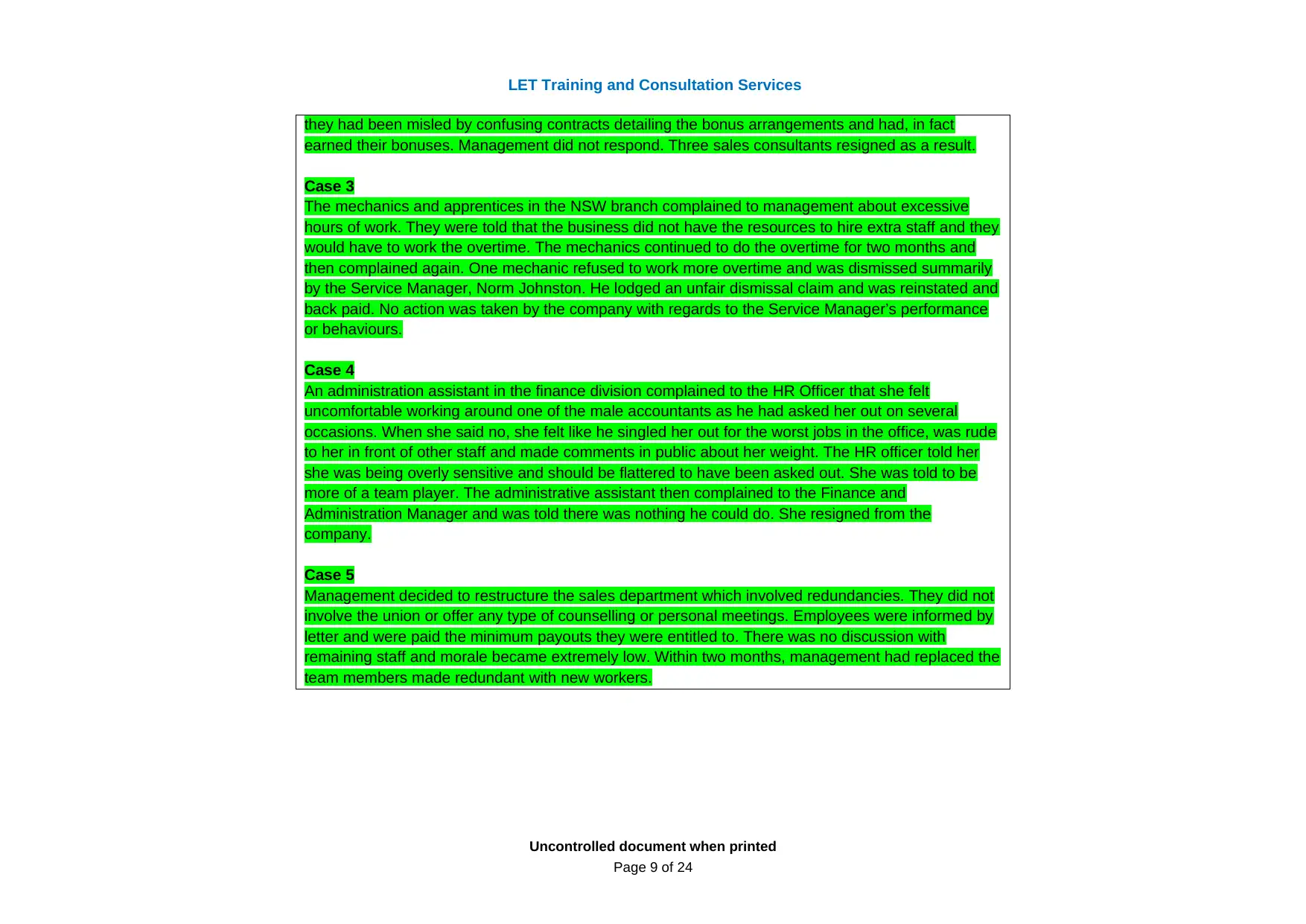
LET Training and Consultation Services
they had been misled by confusing contracts detailing the bonus arrangements and had, in fact
earned their bonuses. Management did not respond. Three sales consultants resigned as a result.
Case 3
The mechanics and apprentices in the NSW branch complained to management about excessive
hours of work. They were told that the business did not have the resources to hire extra staff and they
would have to work the overtime. The mechanics continued to do the overtime for two months and
then complained again. One mechanic refused to work more overtime and was dismissed summarily
by the Service Manager, Norm Johnston. He lodged an unfair dismissal claim and was reinstated and
back paid. No action was taken by the company with regards to the Service Manager’s performance
or behaviours.
Case 4
An administration assistant in the finance division complained to the HR Officer that she felt
uncomfortable working around one of the male accountants as he had asked her out on several
occasions. When she said no, she felt like he singled her out for the worst jobs in the office, was rude
to her in front of other staff and made comments in public about her weight. The HR officer told her
she was being overly sensitive and should be flattered to have been asked out. She was told to be
more of a team player. The administrative assistant then complained to the Finance and
Administration Manager and was told there was nothing he could do. She resigned from the
company.
Case 5
Management decided to restructure the sales department which involved redundancies. They did not
involve the union or offer any type of counselling or personal meetings. Employees were informed by
letter and were paid the minimum payouts they were entitled to. There was no discussion with
remaining staff and morale became extremely low. Within two months, management had replaced the
team members made redundant with new workers.
Uncontrolled document when printed
Page 9 of 24
they had been misled by confusing contracts detailing the bonus arrangements and had, in fact
earned their bonuses. Management did not respond. Three sales consultants resigned as a result.
Case 3
The mechanics and apprentices in the NSW branch complained to management about excessive
hours of work. They were told that the business did not have the resources to hire extra staff and they
would have to work the overtime. The mechanics continued to do the overtime for two months and
then complained again. One mechanic refused to work more overtime and was dismissed summarily
by the Service Manager, Norm Johnston. He lodged an unfair dismissal claim and was reinstated and
back paid. No action was taken by the company with regards to the Service Manager’s performance
or behaviours.
Case 4
An administration assistant in the finance division complained to the HR Officer that she felt
uncomfortable working around one of the male accountants as he had asked her out on several
occasions. When she said no, she felt like he singled her out for the worst jobs in the office, was rude
to her in front of other staff and made comments in public about her weight. The HR officer told her
she was being overly sensitive and should be flattered to have been asked out. She was told to be
more of a team player. The administrative assistant then complained to the Finance and
Administration Manager and was told there was nothing he could do. She resigned from the
company.
Case 5
Management decided to restructure the sales department which involved redundancies. They did not
involve the union or offer any type of counselling or personal meetings. Employees were informed by
letter and were paid the minimum payouts they were entitled to. There was no discussion with
remaining staff and morale became extremely low. Within two months, management had replaced the
team members made redundant with new workers.
Uncontrolled document when printed
Page 9 of 24
⊘ This is a preview!⊘
Do you want full access?
Subscribe today to unlock all pages.

Trusted by 1+ million students worldwide
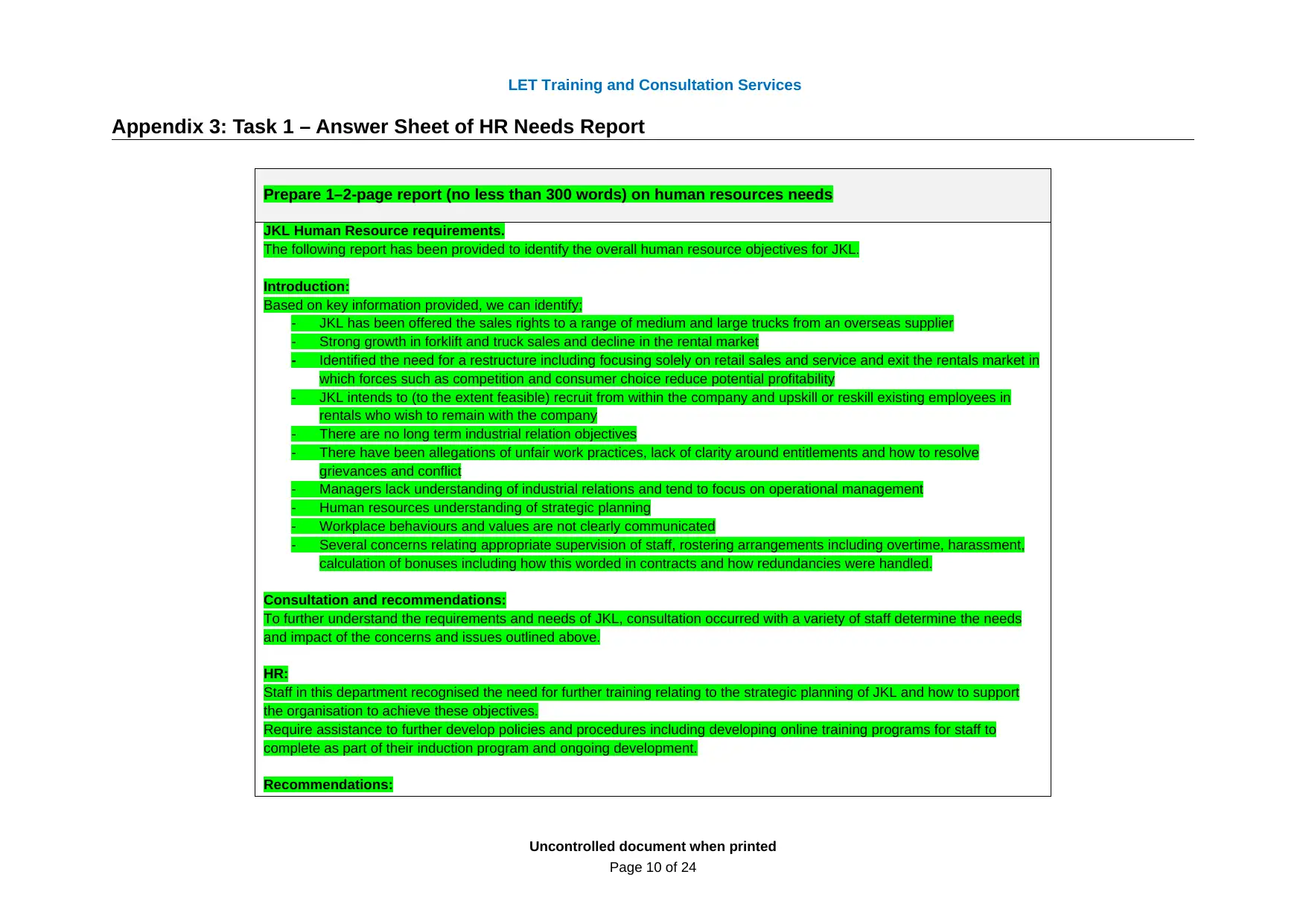
LET Training and Consultation Services
Appendix 3: Task 1 – Answer Sheet of HR Needs Report
Prepare 1–2-page report (no less than 300 words) on human resources needs
JKL Human Resource requirements.
The following report has been provided to identify the overall human resource objectives for JKL.
Introduction:
Based on key information provided, we can identify;
- JKL has been offered the sales rights to a range of medium and large trucks from an overseas supplier
- Strong growth in forklift and truck sales and decline in the rental market
- Identified the need for a restructure including focusing solely on retail sales and service and exit the rentals market in
which forces such as competition and consumer choice reduce potential profitability
- JKL intends to (to the extent feasible) recruit from within the company and upskill or reskill existing employees in
rentals who wish to remain with the company
- There are no long term industrial relation objectives
- There have been allegations of unfair work practices, lack of clarity around entitlements and how to resolve
grievances and conflict
- Managers lack understanding of industrial relations and tend to focus on operational management
- Human resources understanding of strategic planning
- Workplace behaviours and values are not clearly communicated
- Several concerns relating appropriate supervision of staff, rostering arrangements including overtime, harassment,
calculation of bonuses including how this worded in contracts and how redundancies were handled.
Consultation and recommendations:
To further understand the requirements and needs of JKL, consultation occurred with a variety of staff determine the needs
and impact of the concerns and issues outlined above.
HR:
Staff in this department recognised the need for further training relating to the strategic planning of JKL and how to support
the organisation to achieve these objectives.
Require assistance to further develop policies and procedures including developing online training programs for staff to
complete as part of their induction program and ongoing development.
Recommendations:
Uncontrolled document when printed
Page 10 of 24
Appendix 3: Task 1 – Answer Sheet of HR Needs Report
Prepare 1–2-page report (no less than 300 words) on human resources needs
JKL Human Resource requirements.
The following report has been provided to identify the overall human resource objectives for JKL.
Introduction:
Based on key information provided, we can identify;
- JKL has been offered the sales rights to a range of medium and large trucks from an overseas supplier
- Strong growth in forklift and truck sales and decline in the rental market
- Identified the need for a restructure including focusing solely on retail sales and service and exit the rentals market in
which forces such as competition and consumer choice reduce potential profitability
- JKL intends to (to the extent feasible) recruit from within the company and upskill or reskill existing employees in
rentals who wish to remain with the company
- There are no long term industrial relation objectives
- There have been allegations of unfair work practices, lack of clarity around entitlements and how to resolve
grievances and conflict
- Managers lack understanding of industrial relations and tend to focus on operational management
- Human resources understanding of strategic planning
- Workplace behaviours and values are not clearly communicated
- Several concerns relating appropriate supervision of staff, rostering arrangements including overtime, harassment,
calculation of bonuses including how this worded in contracts and how redundancies were handled.
Consultation and recommendations:
To further understand the requirements and needs of JKL, consultation occurred with a variety of staff determine the needs
and impact of the concerns and issues outlined above.
HR:
Staff in this department recognised the need for further training relating to the strategic planning of JKL and how to support
the organisation to achieve these objectives.
Require assistance to further develop policies and procedures including developing online training programs for staff to
complete as part of their induction program and ongoing development.
Recommendations:
Uncontrolled document when printed
Page 10 of 24
Paraphrase This Document
Need a fresh take? Get an instant paraphrase of this document with our AI Paraphraser
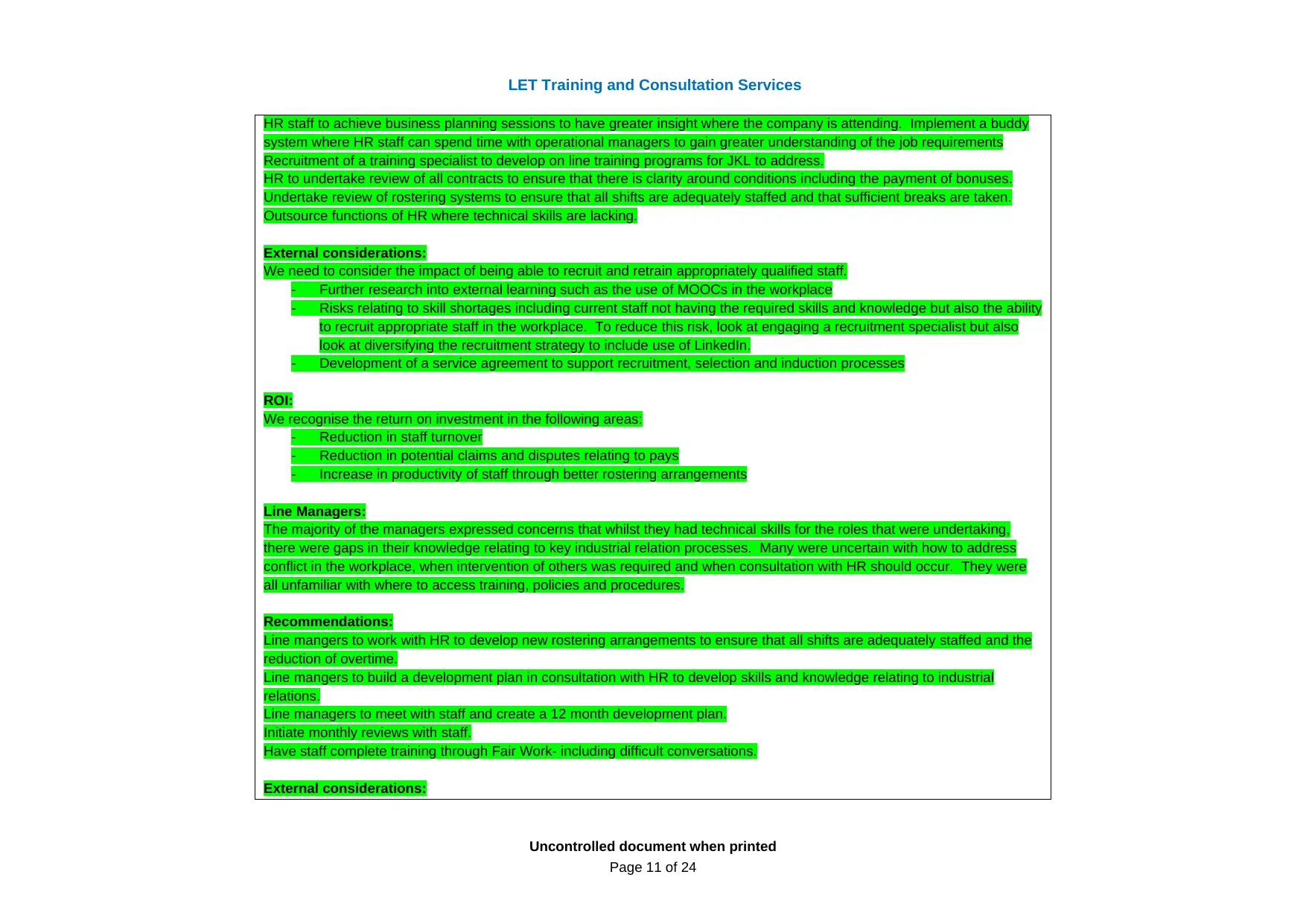
LET Training and Consultation Services
HR staff to achieve business planning sessions to have greater insight where the company is attending. Implement a buddy
system where HR staff can spend time with operational managers to gain greater understanding of the job requirements
Recruitment of a training specialist to develop on line training programs for JKL to address.
HR to undertake review of all contracts to ensure that there is clarity around conditions including the payment of bonuses.
Undertake review of rostering systems to ensure that all shifts are adequately staffed and that sufficient breaks are taken.
Outsource functions of HR where technical skills are lacking.
External considerations:
We need to consider the impact of being able to recruit and retrain appropriately qualified staff.
- Further research into external learning such as the use of MOOCs in the workplace
- Risks relating to skill shortages including current staff not having the required skills and knowledge but also the ability
to recruit appropriate staff in the workplace. To reduce this risk, look at engaging a recruitment specialist but also
look at diversifying the recruitment strategy to include use of LinkedIn.
- Development of a service agreement to support recruitment, selection and induction processes
ROI:
We recognise the return on investment in the following areas:
- Reduction in staff turnover
- Reduction in potential claims and disputes relating to pays
- Increase in productivity of staff through better rostering arrangements
Line Managers:
The majority of the managers expressed concerns that whilst they had technical skills for the roles that were undertaking,
there were gaps in their knowledge relating to key industrial relation processes. Many were uncertain with how to address
conflict in the workplace, when intervention of others was required and when consultation with HR should occur. They were
all unfamiliar with where to access training, policies and procedures.
Recommendations:
Line mangers to work with HR to develop new rostering arrangements to ensure that all shifts are adequately staffed and the
reduction of overtime.
Line mangers to build a development plan in consultation with HR to develop skills and knowledge relating to industrial
relations.
Line managers to meet with staff and create a 12 month development plan.
Initiate monthly reviews with staff.
Have staff complete training through Fair Work- including difficult conversations.
External considerations:
Uncontrolled document when printed
Page 11 of 24
HR staff to achieve business planning sessions to have greater insight where the company is attending. Implement a buddy
system where HR staff can spend time with operational managers to gain greater understanding of the job requirements
Recruitment of a training specialist to develop on line training programs for JKL to address.
HR to undertake review of all contracts to ensure that there is clarity around conditions including the payment of bonuses.
Undertake review of rostering systems to ensure that all shifts are adequately staffed and that sufficient breaks are taken.
Outsource functions of HR where technical skills are lacking.
External considerations:
We need to consider the impact of being able to recruit and retrain appropriately qualified staff.
- Further research into external learning such as the use of MOOCs in the workplace
- Risks relating to skill shortages including current staff not having the required skills and knowledge but also the ability
to recruit appropriate staff in the workplace. To reduce this risk, look at engaging a recruitment specialist but also
look at diversifying the recruitment strategy to include use of LinkedIn.
- Development of a service agreement to support recruitment, selection and induction processes
ROI:
We recognise the return on investment in the following areas:
- Reduction in staff turnover
- Reduction in potential claims and disputes relating to pays
- Increase in productivity of staff through better rostering arrangements
Line Managers:
The majority of the managers expressed concerns that whilst they had technical skills for the roles that were undertaking,
there were gaps in their knowledge relating to key industrial relation processes. Many were uncertain with how to address
conflict in the workplace, when intervention of others was required and when consultation with HR should occur. They were
all unfamiliar with where to access training, policies and procedures.
Recommendations:
Line mangers to work with HR to develop new rostering arrangements to ensure that all shifts are adequately staffed and the
reduction of overtime.
Line mangers to build a development plan in consultation with HR to develop skills and knowledge relating to industrial
relations.
Line managers to meet with staff and create a 12 month development plan.
Initiate monthly reviews with staff.
Have staff complete training through Fair Work- including difficult conversations.
External considerations:
Uncontrolled document when printed
Page 11 of 24
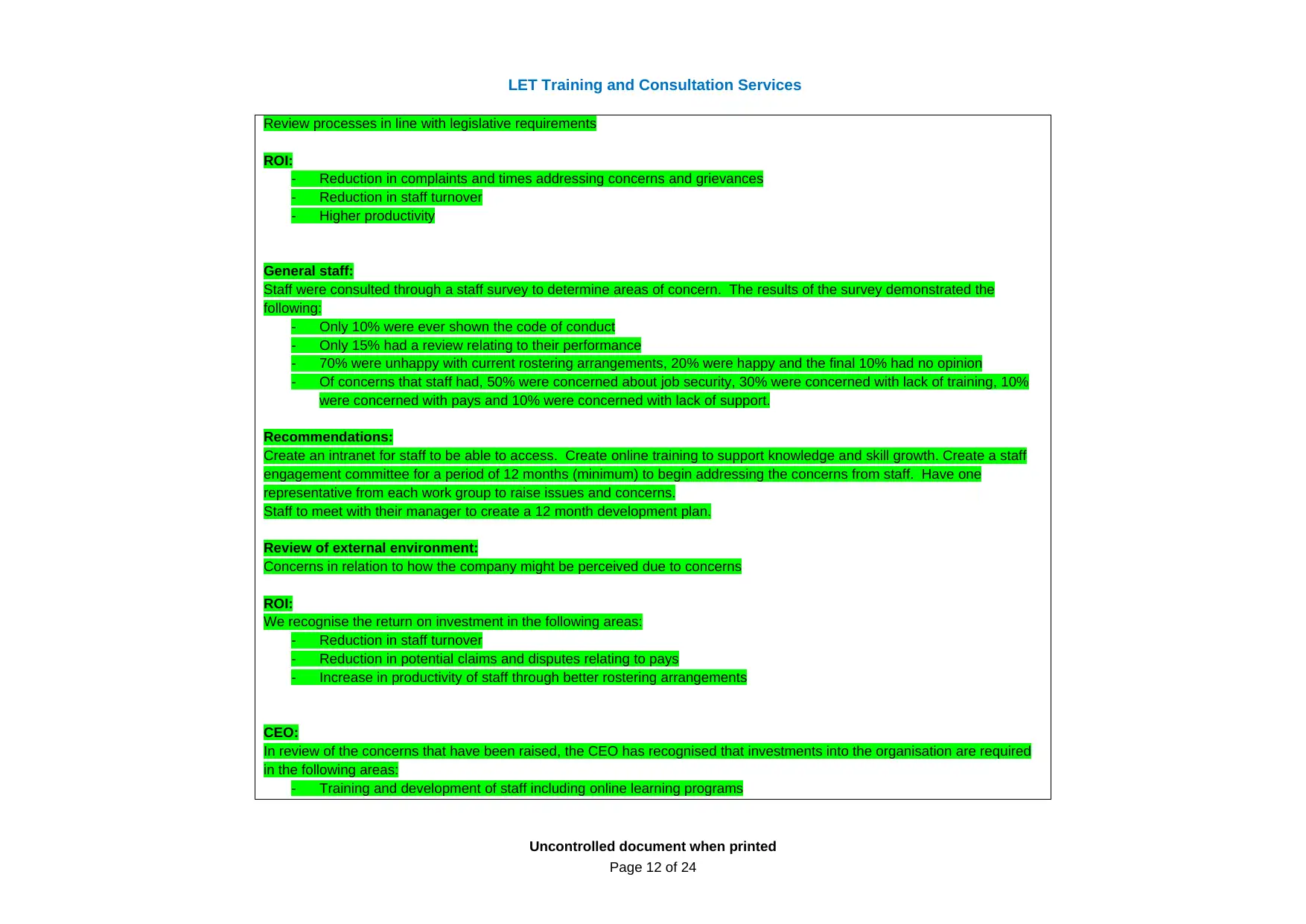
LET Training and Consultation Services
Review processes in line with legislative requirements
ROI:
- Reduction in complaints and times addressing concerns and grievances
- Reduction in staff turnover
- Higher productivity
General staff:
Staff were consulted through a staff survey to determine areas of concern. The results of the survey demonstrated the
following:
- Only 10% were ever shown the code of conduct
- Only 15% had a review relating to their performance
- 70% were unhappy with current rostering arrangements, 20% were happy and the final 10% had no opinion
- Of concerns that staff had, 50% were concerned about job security, 30% were concerned with lack of training, 10%
were concerned with pays and 10% were concerned with lack of support.
Recommendations:
Create an intranet for staff to be able to access. Create online training to support knowledge and skill growth. Create a staff
engagement committee for a period of 12 months (minimum) to begin addressing the concerns from staff. Have one
representative from each work group to raise issues and concerns.
Staff to meet with their manager to create a 12 month development plan.
Review of external environment:
Concerns in relation to how the company might be perceived due to concerns
ROI:
We recognise the return on investment in the following areas:
- Reduction in staff turnover
- Reduction in potential claims and disputes relating to pays
- Increase in productivity of staff through better rostering arrangements
CEO:
In review of the concerns that have been raised, the CEO has recognised that investments into the organisation are required
in the following areas:
- Training and development of staff including online learning programs
Uncontrolled document when printed
Page 12 of 24
Review processes in line with legislative requirements
ROI:
- Reduction in complaints and times addressing concerns and grievances
- Reduction in staff turnover
- Higher productivity
General staff:
Staff were consulted through a staff survey to determine areas of concern. The results of the survey demonstrated the
following:
- Only 10% were ever shown the code of conduct
- Only 15% had a review relating to their performance
- 70% were unhappy with current rostering arrangements, 20% were happy and the final 10% had no opinion
- Of concerns that staff had, 50% were concerned about job security, 30% were concerned with lack of training, 10%
were concerned with pays and 10% were concerned with lack of support.
Recommendations:
Create an intranet for staff to be able to access. Create online training to support knowledge and skill growth. Create a staff
engagement committee for a period of 12 months (minimum) to begin addressing the concerns from staff. Have one
representative from each work group to raise issues and concerns.
Staff to meet with their manager to create a 12 month development plan.
Review of external environment:
Concerns in relation to how the company might be perceived due to concerns
ROI:
We recognise the return on investment in the following areas:
- Reduction in staff turnover
- Reduction in potential claims and disputes relating to pays
- Increase in productivity of staff through better rostering arrangements
CEO:
In review of the concerns that have been raised, the CEO has recognised that investments into the organisation are required
in the following areas:
- Training and development of staff including online learning programs
Uncontrolled document when printed
Page 12 of 24
⊘ This is a preview!⊘
Do you want full access?
Subscribe today to unlock all pages.

Trusted by 1+ million students worldwide
1 out of 24
Related Documents
Your All-in-One AI-Powered Toolkit for Academic Success.
+13062052269
info@desklib.com
Available 24*7 on WhatsApp / Email
![[object Object]](/_next/static/media/star-bottom.7253800d.svg)
Unlock your academic potential
Copyright © 2020–2026 A2Z Services. All Rights Reserved. Developed and managed by ZUCOL.



